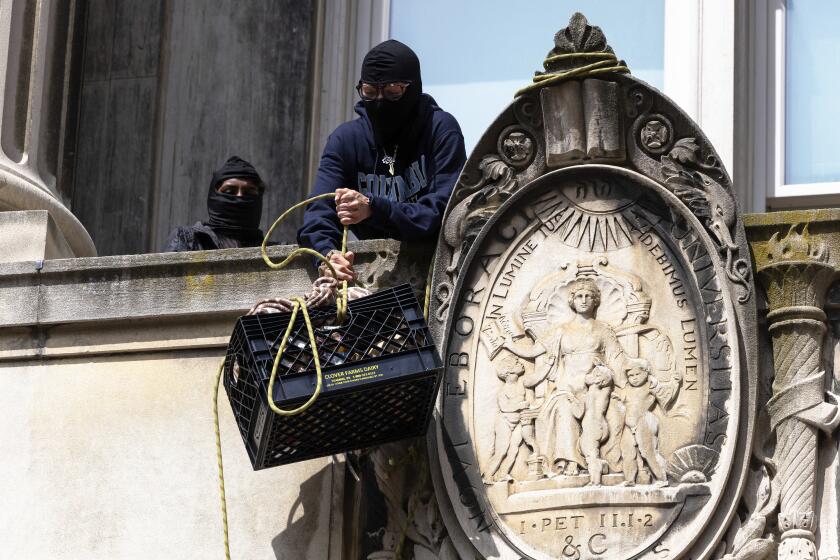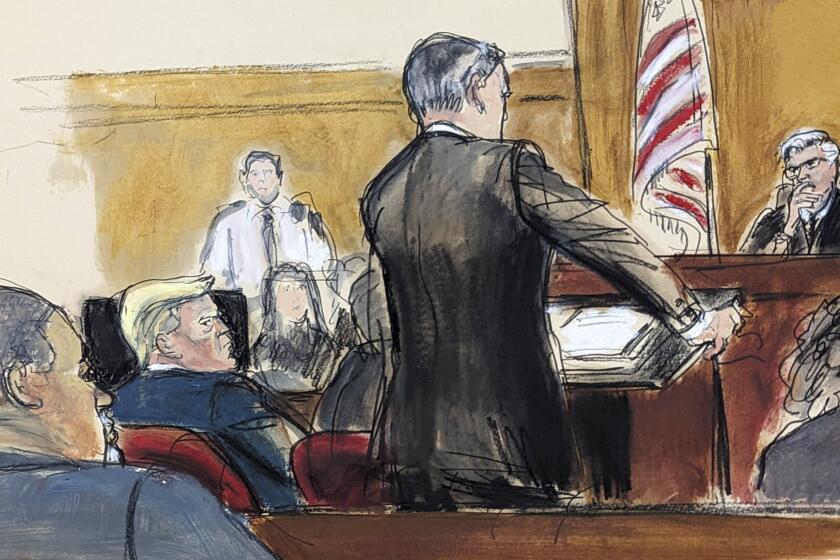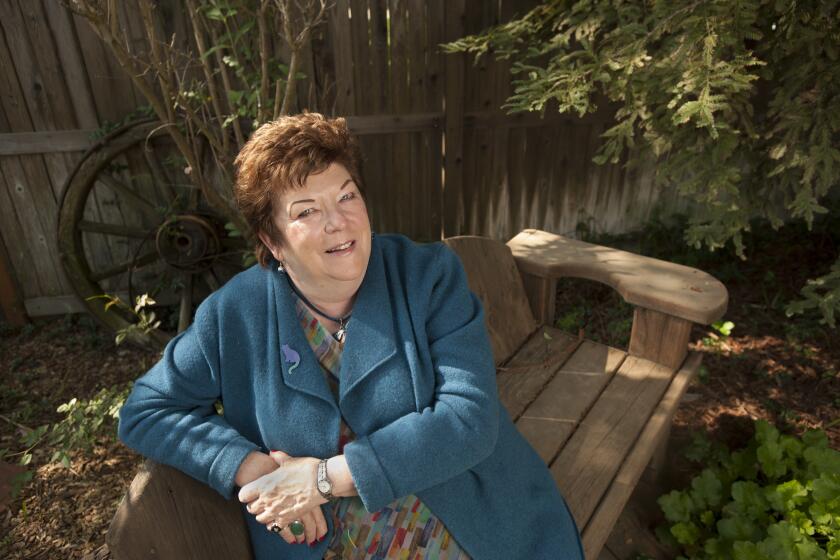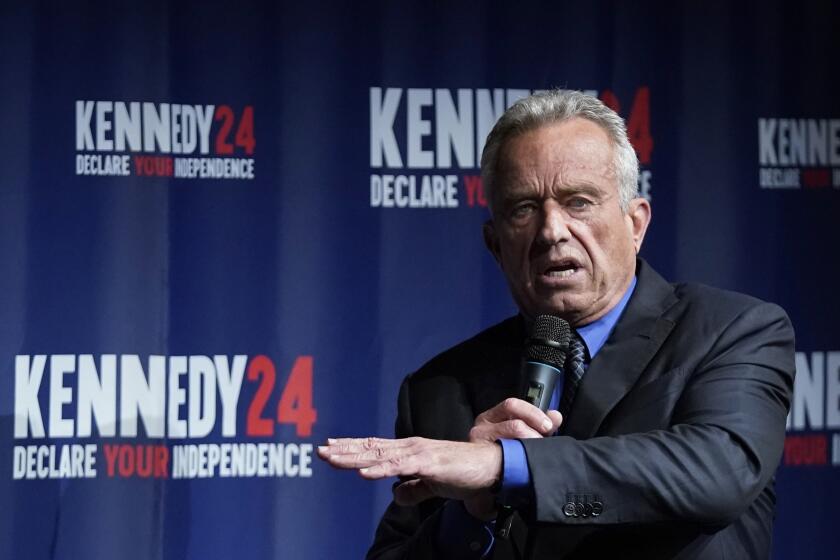Incumbency, experience key issues in California races for controller, treasurer
California’s already worst-in-the-nation credit rating has plummeted. The cash-poor state issued IOUs for only the second time in 80 years. The state budget has gone from bad to worse.
Yet the top two elected financial officials, Controller John Chiang and Treasurer Bill Lockyer, are both eagerly seeking a second term.
“Challenging times are more invigorating,” said Lockyer, 69, who is California’s longest-serving elected official at the state level and heading into his 37th straight year in office.
Chiang, 47, said that although Californians were angry about the IOUs he sent out instead of cash last summer, he’s proud to have helped keep the state from insolvency: The state did not have to default on its debts, shutter schools or release prisoners en masse.
“I did everything I could humanly possible,” Chiang said.
Despite the turmoil, neither Chiang, who acts as the state’s accountant, nor Lockyer, who acts as its banker, faces an opponent in the Democratic primary June 8. But Republicans are gunning for both come November, hoping to ride a tide of voter unrest into the statewide posts.
“It’s an anti-incumbency year. People are upset with what has happened. Look at the … ‘tea party’ movement,” said state Sen. Mimi Walters (R- Laguna Niguel), the lone Republican seeking to unseat Lockyer in the general election. “Government has gotten too big, and my opponent is part of that problem.”
Among other responsibilities, the treasurer is charged with selling state bonds, proceeds of which can be used to build roads, schools, dams and housing. Walters, a 48-year-old former investment banker, said, “We cannot afford to take on more debt,” although she stopped short of saying she would stop selling bonds.
Lockyer, a former state attorney general, assemblyman and leader of the state Senate, highlighted his record as treasurer: greening the state’s investment portfolio, using the bully pulpit to call for a balanced budget and pressuring Wall Street to overhaul a ratings system that he said costs California taxpayers millions.
“My opponent and others would say, ‘He’s been in government too long.’ And I understand that point of view,” Lockyer said. “But it seems to me it’s prudent to have some mix of new and old.” Lockyer said he has “knowledge that goes deeper than slogans.”
He is also sitting atop the largest campaign cash pile of any official in the state not running for governor: $9.1 million. Walters has $300,000 in her treasury.
The controller’s contest, meanwhile, appears headed toward a rematch of a bruising 2006 campaign that pitted Chiang against Tony Strickland, a Republican from Moorpark who is now a state senator. An underfunded David Evans, a certified public accountant from California City, is also seeking the GOP nomination.
Strickland, 40, has accused Chiang of being too “passive”: failing to audit state spending aggressively enough. “We need to maximize the precious dollars that do come to Sacramento,” he said.
Like Walters, Strickland said the state needs new leadership. But, also like Walters, he is an incumbent state legislator who could be tarred by the same anti-incumbent brush.
Strickland sees himself as an outsider. Referring to a recent public poll showing that only 9% of Californians approved of the Legislature, he said: “I want to know who those 9% are.... I think the Legislature’s doing a horrible job.”
Chiang, meanwhile, has earned plaudits from the financial community. In January, as Standard & Poor’s downgraded the state credit rating, it cited Chiang’s cash management as one of the few bright spots in the state.
In the last three years, the soft-spoken, bespectacled Chiang has emerged as an unlikely foil to the hulking Schwarzenegger. When the governor proposed cutting state workers’ pay to minimum wage during a 2008 budget standoff, Chiang said no. When Schwarzenegger wanted to furlough state workers in 2009, Chiang again said no.
The courts overruled Chiang in both cases. But in the process, he became a folk hero among the public labor unions whose paychecks he was protecting. Unions were among Chiang’s biggest financial backers in his 2006 election.
That race was largely a proxy war between two special interests: business and labor. Union-led groups spent $3.5 million aiding Chiang. Businesses spent more than $2 million supporting Strickland.
The money showed that there is more at stake in the controller’s contest than who will manage California’s cash supply. The controller is the swing vote on the state’s elected tax board and sits on the State Lands Commission, which, with Chiang as a decisive vote, last year rejected a plan for oil drilling off the coast of Santa Barbara County.
Strickland said that, if elected, he would push for the oil drilling proposal.
More to Read
Get the L.A. Times Politics newsletter
Deeply reported insights into legislation, politics and policy from Sacramento, Washington and beyond. In your inbox three times per week.
You may occasionally receive promotional content from the Los Angeles Times.






